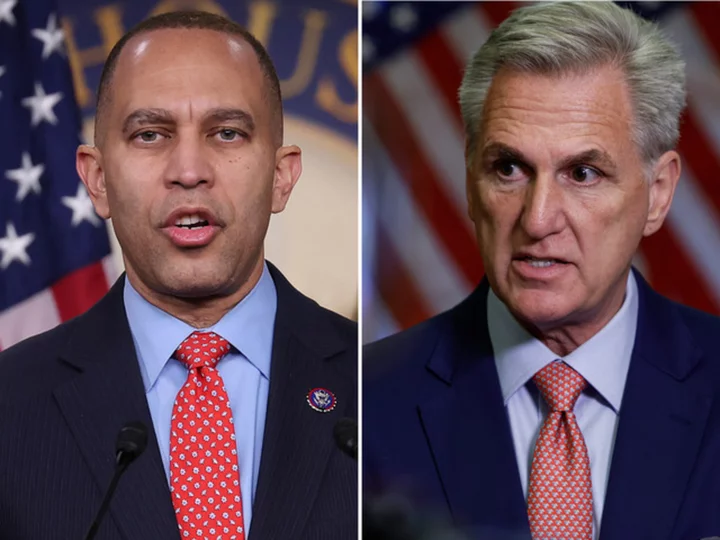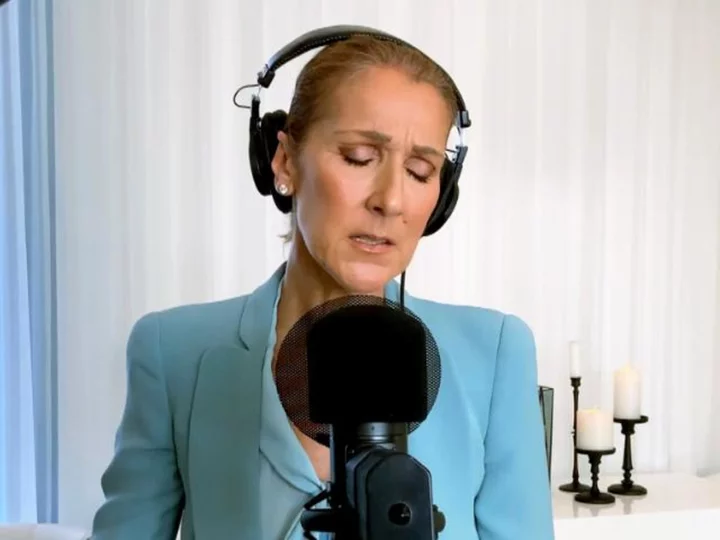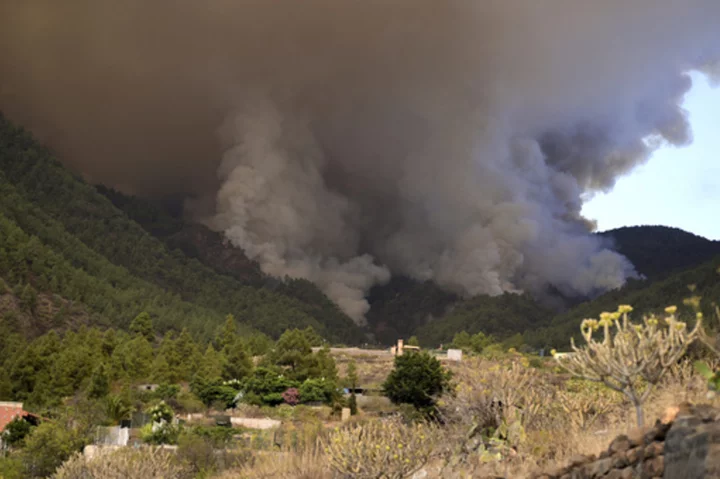House Democrats have begun internal discussions about how to deal with the prospects of a chaotic situation: The possibility that Speaker Kevin McCarthy could lose his job in an unprecedented vote on the floor.
While no decisions have been made, some of the party's moderates are privately signaling they'd be willing to cut a deal to help McCarthy stave off a right-wing revolt -- as long as the speaker meets their own demands.
Publicly, Democratic leader Hakeem Jeffries has not weighed in on how he'd want his members to manage a challenge to McCarthy's speakership, saying it's hypothetical at this point. But privately, Jeffries has counseled his members to keep their powder dry, according to multiple sources, a recognition it's better for Democrats to keep their options open as the government funding fight plays outs.
"If somehow Democrats are asked to be helpful, it's not just going to have to be out of the kindness of our hearts," Democratic Rep. Dan Kildee of Michigan, told CNN. "If Kevin can't govern with just his part -- which clearly he can't -- and he wants to have a conversation with us about how to do that, we are going to have a policy conversation."
Asked recently by CNN if he would need to rely on Democrats to help save him, McCarthy would not say.
"I am not worried about that," he said.
The private discussions have picked up steam in recent days, as a handful of hardline GOP members dig in against a series of spending bills -- an effort that could catapult the government into a shutdown -- and as any move the speaker takes to advance a short-term spending bill with Democrats could trigger the end of his speakership.
If McCarthy's position was threatened with a so-called motion to vacate, and there were five Republicans backing it, Democrats would have a major role in deciding McCarthy's fate.
But members who spoke to CNN made clear that any Democratic help would come at a cost. And their asking price for saving his speakership, Democratic members say, is a bipartisan deal to avoid a shutdown -- a route McCarthy is not yet prepared to take, as Republicans are still trying to find consensus on a GOP plan to fund the government.
"I think it is fair to say Democrats have a responsibility to be preparing for the possibility that there will be some sort of upheaval," one Democratic member told CNN.
One of the strategies being discussed by Democrats is to vote "present" or vote to kill it all together if a motion to oust McCarthy is brought to the floor. Voting present would change the threshold and make it harder for McCarthy's critics to oust him, which would require a majority of those voting in order to succeed.
It's a complicated dance for Democrats, who don't want to be seen as saving McCarthy -- especially after he just launched an impeachment inquiry into President Joe Biden -- and could open them up to backlash on the left. But some Democrats also fear the potential alternative: a government shutdown and the prospect of an even more right-wing lawmaker ascending to the speakership if McCarthy is ousted -- or the House being paralyzed with no candidate able to win 218 votes to be elected speaker.
"If he just jams us with something awful, and they still try to kill him, and that's gonna be his approach to work with the Freedom Caucus, there's less incentive (to help him)," said one Democrat. "Still, even then, you're gonna have a lot of people who say: 'Well I think what's behind door No. 3 might be a lot worse.'"
"I think if he's willing to work together on things," the member said, adding, "There will be enough of us to protect him."
It's still not clear when or if McCarthy's detractors would try and push the issue. Republican Rep. Matt Gaetz of Florida -- one of McCarthy's most vocal critics -- would not specify Wednesday when he would move to force a vote on removing McCarthy as speaker. But he warned McCarthy against working with Democrats, and said House Republicans who work with Democrats to avoid a shutdown would be signing their own "political death warrant."
"If Speaker McCarthy relies on Democrats to pass a continuing resolution, I would call the Capitol moving truck to his office pretty soon because my expectation would be he'd be out of the speaker's office quite promptly," said Gaetz, who privately told his colleagues Wednesday there are seven Republicans who would vote against any stop-gap measure, enough to kill it if all Democrats oppose a conservative plan.
With less than two weeks before a government shutdown, Democrats are watching the speaker's actions carefully on spending and taking whether McCarthy is willing to cut his right flank lose in pursuit of a bipartisan deal on spending -- short-handed on Capitol Hill as a continuing resolution or a CR -- into consideration for how they'd act on the floor if a motion to vacate were brought forward.
"If we were actually part of the deal, like actually part of a commonsense agreement on CR and budget, I think you would find a significant group of people willing to vote present," one Democrat said.
Meanwhile, as frustration in the GOP has reached a fever pitch, private talks between moderate Democrats and Republicans about a bipartisan funding deal have grown more serious: the bipartisan Problem Solvers Caucus has developed a framework for a plan, and Jeffries stopped by their meeting on Wednesday.
Leaving the meeting, Jeffries called for a bipartisan agreement in line with what was already negotiated in the debt ceiling package -- a deal cut by McCarthy but later abandoned amid pressure from his right flank to seek deeper cuts.
"We need to find a bipartisan agreement consistent with what was previously reached," he said.
But the mechanism for putting such a bill on the floor is complicated. One possible option is for GOP members of the group to sign onto a so-called discharge petition, a complicated and time-consuming procedural mechanism. If five Republicans did so, it would trigger a process that could force the bill onto the floor for a vote without McCarthy having to do it. But that process would likely take too long at this point to avert a shutdown.
Members are also discussing other procedural options with the House parliamentarian, lawmakers told CNN.
"Failure is not an option. We're gonna do everything we can to prevent a shutdown," said Republican Rep. Don Bacon, who represents a swing district in Nebraska.
Bacon warned that he would cut a deal with Democrats if they reach an impasse with conservative hardliners.
"Well, in the end, if not, we will have to work across the aisle and get it done. I think people got that message," he said.
But the growing consensus is that with time running out, the most viable path to avoid a government shutdown is for the speaker to cut his right flank loose and make a deal with the middle -- and then Democrats could bail McCarthy out from the inevitable vote to oust him that would be triggered by that scenario.
Democrats considering bailing out McCarthy say it wouldn't necessarily stop there.
"We are having pretty broad conversations about like, use your imagination in terms of how you re-envision ... this place is not working," the member said. "I don't think it would ever be as transactional as 'OK, I get a vote on my bill and I am done ...' because you can't trust him. I think then it becomes everything from what is committee presentation to how bills get pulled to the floor and how are those decisions made?"
An opportunity to extract concessions from McCarthy, however, likely would never be enough for some Democrats. For Democrats, extending a lifeline to McCarthy could mean facing a primary challenge back home, not to mention the fact that any goodwill McCarthy might have still had with some Democrats evaporated with his announcement he was launching an impeachment inquiry into Biden.
"There is not a chance in hell I would vote for the speaker. I barely have words. What reasonable thing has he done? What demonstrable outreach has he made to try to bring the House together, to work together in a deliberative and cooperative way," Democratic Rep. Debbie Wasserman Schultz of Florida told CNN. "The real answer is I don't see a scenario right now in which he would warrant my support, but I also would never say never."
Democratic Rep. Dean Phillips of Minnesota recently said "right now, no," he and other Democrats would not come to McCarthy's rescue if he faced a motion to vacate from his own party.
"If you'd asked about two months ago I would have said absolutely. But I think sadly his behavior is unprincipled, it's unhelpful to the country," he said.
He continued later: "I understand the position he's in but these are times when people have to make a choice. Do you pander to the few or do you take care of the many?"
Several Democrats argued that past Republican speakers -- like Paul Ryan or John Boehner -- may have been worth saving. But McCarthy, they argue is different.
If McCarthy were challenged, it may only take a handful of Democrats to save him. Aside from voting "present," they could also just vote to table the resolution -- a procedural workaround that would essentially kill the effort. But, letting members walk the plank alone could be politically dangerous for moderates. Voting in total Democratic unison could shield members from the base.
"I think we need to have a party position on it. I don't think that has been resolved yet. It is still evolving," Democratic Rep. Richard Neal of Massachusetts told CNN.
Many Democrats are still weighing their options.
"You know there are so many variables right now, I really don't have an answer," Rep. Mary Gay Scanlon of Pennsylvania told CNN.









